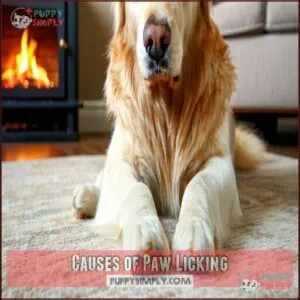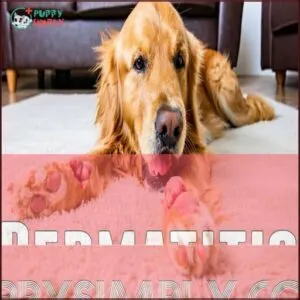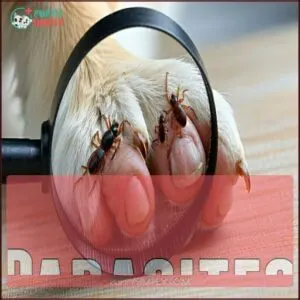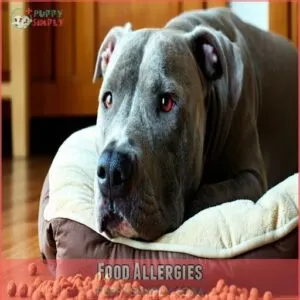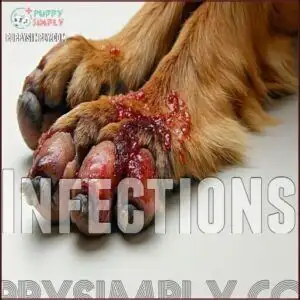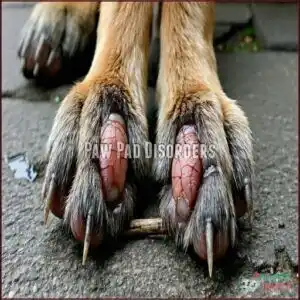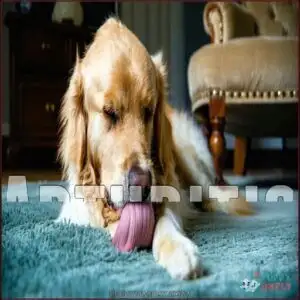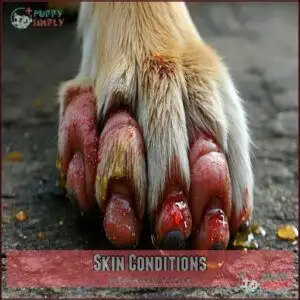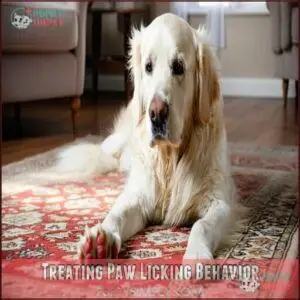This site is supported by our readers. We may earn a commission, at no cost to you, if you purchase through links.

Dogs do this for several reasons: allergies (environmental or food-related), injuries, parasites, infections, grooming problems, or anxiety.
Like how you might scratch an itch, your dog is trying to relieve discomfort.
While occasional paw attention is normal for cleaning, excessive licking that continues despite distractions or causes redness is a warning sign.
The key is determining which culprit is behind your furry friend’s behavior—sometimes the solution is as simple as changing their diet or adding a daily foot soak to their routine, which can help alleviate redness.
Table Of Contents
- Key Takeaways
- Causes of Paw Licking
- Why Dogs Lick Paws
- Common Paw Licking Causes
- Medical Conditions and Paw Licking
- Treating Paw Licking Behavior
- Frequently Asked Questions (FAQs)
- Why is my dog licking and biting his paws?
- What is your dog trying to warn about when they lick their paws?
- Should I take my dog to the vet if she keeps licking her paws?
- How do I get my dog to stop licking his paws?
- How do I get my dog to stop chewing and licking his paws?
- How to treat a dog licking a paw raw?
- Why does my dog lick and bite his paws?
- Why do dogs lick and chew their feet?
- Why do dogs lick themselves?
- Do dogs lick their paws?
- Conclusion
Key Takeaways
- Your dog’s paw licking often signals underlying issues like allergies, infections, injuries, parasites, or anxiety – it’s their way of communicating discomfort rather than just a habit.
- Watch for warning signs including redness, swelling, discharge, or odor from paws, as well as behavioral patterns like increased licking after certain activities or during specific seasons.
- You’ll need to identify the root cause before treatment – whether it’s environmental allergens, food sensitivities, dermatitis, or behavioral issues – as each requires a different approach.
- Regular maintenance through proper grooming, nail care, paw checks after walks, and addressing anxiety can prevent many paw problems before they lead to excessive licking and discomfort.
Causes of Paw Licking
Your dog’s persistent paw licking can stem from several medical conditions including allergies, infections, or injuries that cause discomfort or irritation.
You’ll need to identify the specific trigger, whether it’s pododermatitis, environmental allergens, or anxiety, to properly address this common but concerning behavior.
Pododermatitis
Pododermatitis, the clinical term for inflamed dog paws, is a common cause of excessive paw licking and biting.
This painful condition occurs when your dog’s paws become inflamed, often due to bacteria or fungal infections.
Five key indicators of pododermatitis include:
- Redness between paw pads
- Swelling around toes
- Discharge or odor from paws
- Limping or favoring certain paws
- Constant licking or chewing of affected areas
Early diagnosis and treatment prevent more serious complications.
Allergies
Allergies rank among the most common reasons your dog might obsessively lick or bite their paws.
These reactions occur when your pet’s immune system overreacts to certain substances.
Common triggers include:
- Environmental Allergens – Pollen, dust mites, and grass can cause seasonal itching
- Food Sensitivities – Proteins like chicken or beef often trigger reactions
- Flea Saliva – Even one bite can cause intense itching
- Household Products – Cleaning supplies or carpet fresheners
- Mold or Mildew – Often overlooked allergen sources
Secondary infections, such as bacterial or yeast infections, can also arise from constant paw licking.
Pain or Injury
Your dog’s excessive paw licking often signals pain or injury. When your furry friend encounters cuts, burns, or foreign objects, they instinctively try to heal themselves through licking and biting.
A common issue can be embedded foreign objects requiring careful removal.
| Injury Type | Common Signs | Treatment Approach |
|---|---|---|
| Foreign Objects | Sudden licking, limping | Gentle removal with tweezers |
| Joint Discomfort | Persistent licking, stiffness | Pain medication, limited activity |
| Cuts/Lacerations | Visible wounds, bleeding | Clean with mild soap, bandage |
| Burns | Blisters, redness | Cool water, petroleum jelly |
| Growth/Abnormalities | Continuous biting, lumps | Veterinary examination |
If dog paw pain persists for more than a few days, consult your veterinarian to prevent infection and ensure proper treatment.
Nail or Grooming Issues
While physical pain can cause paw discomfort, nail issues often go unnoticed as culprits. Overgrown nails can press painfully into paw pads, causing your dog to lick or bite for relief.
Torn nails create sharp edges that catch on surfaces, while matted fur between toes traps moisture and debris.
Regular nail trimming prevents these problems—aim for monthly maintenance using proper grooming tools designed for dogs.
Proper trimming requires specialized dog clippers for safe use.
Inspect between toes during grooming sessions to remove tangles before they become problematic. Maintaining good paw hygiene reduces irritation that leads to excessive licking behaviors, which is crucial for preventing paw discomfort and ensuring your dog’s overall health through regular maintenance and proper care, including the use of specialized tools.
Anxiety
Nervous energy in your furry friend often manifests as paw obsession.
When separation anxiety strikes, dogs may resort to compulsive chewing as a self-soothing mechanism.
Watch for these telltale signs:
- Restlessness or pacing
- Excessive licking or nibbling
- Panic reactions during stressful situations
- Seeking comfort through repeated paw-licking
Without proper stress reduction techniques, this behavioral issue can become habitual.
Boredom relief through interactive toys and regular exercise, combined with calming techniques like pressure wraps, can substantially reduce dog anxiety and related paw biting.
Why Dogs Lick Paws
When your furry friend repeatedly licks their paws, they’re sending you important signals. This seemingly simple behavior actually reveals a lot about your dog’s health and comfort.
Dogs speak through their actions — persistent paw licking is their way of signaling distress or discomfort.
Compulsive licking often indicates underlying issues. Your dog’s paw anatomy makes these areas sensitive to problems – from environmental irritants to deeper medical concerns.
While occasional grooming has licking benefits (saliva enzymes help clean minor wounds), excessive paw licking typically signals distress. Some breeds show breed predisposition to this behavior, particularly those prone to allergies.
Dog paw anxiety, dermatitis, or allergies are common culprits behind the licking. Common triggers can include flea and tick infestations, which cause intense itching.
Pay attention to patterns – is it seasonal? After walks? Understanding these patterns helps identify whether it’s physical discomfort or emotional stress causing your dog’s paw focus.
Common Paw Licking Causes
You’ll find that your dog’s paw licking often stems from common issues like dermatitis, parasites, food allergies, or behavioral concerns.
Understanding these underlying causes can help you address the problem effectively and restore your pet’s comfort.
Dermatitis
While your dog’s paw licking may seem harmless, it could signal dermatitis — inflammation that causes intense itching and discomfort.
Dermatitis comes in several types: contact, atopic, allergic, and acute moist (hot spots).
Each presents with redness, irritation, and sometimes crusty skin on your dog’s paws. Without treatment, dog paw dermatitis can worsen into secondary infections.
Regular paw inspection and prompt veterinary care prevent complications, keeping your furry friend comfortable.
Parasites
While dermatitis affects the skin directly, parasites represent another common culprit behind your dog’s paw problems.
Tiny invaders like fleas, ticks, and mites often hide between toe pads, causing intense itching that leads to excessive paw licking and biting.
Three ways to combat canine parasites:
- Implement consistent flea prevention year-round
- Check between toes during grooming sessions
- Consult your vet about appropriate deworming protocols
Regular parasite identification and control keeps your dog’s paws itch-free, which is key to maintaining their overall health and preventing excessive paw licking.
Food Allergies
While parasites attack from the outside, food allergies work from within to make your dog lick their paws.
Food allergies often manifest through dog paw licking and biting. When your pet develops ingredient sensitivity to common proteins, their paws become itchy battlegrounds. A diet elimination strategy or food trials with novel proteins can identify the culprits.
Diagnosing the issue often requires an elimination diet to pinpoint the specific allergen.
| Allergy Symptoms | What You’ll Notice |
|---|---|
| Paw redness | Constant licking |
| Ear infections | Frustrated pup |
| Itchy skin | Restless nights |
| Digestive upset | Frequent bathroom |
| Face rubbing | Furniture damage |
Your vet can help pinpoint these canine food sensitivities through proper testing, which is a critical step in identifying the specific allergen and providing relief to your pet, ultimately leading to a healthier life.
Behavioral Issues
Many dogs develop paw licking or biting due to behavioral issues rather than physical problems.
This compulsive behavior often stems from underlying anxiety triggers or boredom.
Watch for these dog paw anxiety signs:
- Excessive licking after changes in routine
- Intensified paw attention during thunderstorms
- Consistent biting when left alone
- Focused licking on one particular paw
- Pattern of behavior that worsens during stressful events
Medical Conditions and Paw Licking
Your dog’s persistent paw licking can often signal underlying medical conditions that need your attention, including infections, pad disorders, arthritis, or skin problems.
You’ll need to watch for signs like redness, swelling, limping, or unusual odors to identify which specific issue might be causing your pet’s discomfort.
Infections
Infections often trigger your dog’s paw licking behavior.
Bacterial infections, yeast overgrowth, and fungal infections create redness, swelling, and a distinct odor. You’ll notice brown discoloration between paw pads and excessive licking when a dog paw infection develops.
Infection Type Symptoms Action
Yeast Infection
Bacterial Infection
Fungal Infection
Paw Pad Disorders
While infections can trigger paw issues, disorders of the paw pads themselves often cause your dog to lick and bite for relief.
Pad Hyperkeratosis, where the pads thicken abnormally, creates significant discomfort.
- Fissures and Ulcers form painful cracks in pads that dogs try to soothe
- Pad Trauma from hot pavement or rough terrain causes persistent licking
- Foreign Bodies like splinters or thorns get stuck between pads
- Neoplasia (abnormal growths) can develop on pads, creating irritation
Regular paw checks help catch these issues early, and addressing paw issues promptly is crucial for your dog’s comfort. Pad Hyperkeratosis is a condition that needs attention, and foreign bodies can cause significant pain.
Arthritis
While paw pad issues can cause discomfort, arthritis is another culprit behind your dog’s paw licking habits.
Joint pain makes dogs lick their paws as a coping mechanism, especially in older pets.
Regular inspections can also help prevent hot surface burns.
Watch for limping, reluctance to climb stairs, or stiffness after rest.
Arthritis pain relief options include joint supplements, weight management, and gentle exercise modification.
Physical therapy can also help manage dog paw pain and reduce excessive licking behaviors.
Skin Conditions
Throughout the year, skin conditions remain a leading cause of your dog’s paw licking behavior.
When your furry friend suffers from dog dermatitis, fungal infections, or bacterial dermatitis, their discomfort becomes evident through excessive attention to their paws.
Watch for these telling signs:
- Red, inflamed skin between paw pads with noticeable flaking
- Yellowish discharge with a distinct odor indicating infection
- Crusty, thickened skin typical of mange requiring treatment
Maintaining clean, moisturized paws helps prevent irritation and allergy symptoms.
Treating Paw Licking Behavior
You’ll need to identify the root cause of your dog’s paw licking before starting an effective treatment plan.
Your veterinarian can help determine whether your pet needs antibiotics for infections, antihistamines for allergies, pain management for injuries, or behavioral modification for anxiety-related licking.
Antibiotics and Antihistamines
When dealing with persistent paw problems, medications often become necessary tools in your pet care arsenal.
Antibiotics target bacterial skin infections causing irritation, while antihistamines provide allergy relief by blocking the immune system’s overreaction.
Veterinary treatments like Cytopoint can offer 6-8 weeks of symptom control for severe cases. You can find dog paw antibiotics at online retailers.
Be aware that antihistamine sedation affects some dogs, while others may become hyperactive. Always consult your vet before starting any treatment to prevent antibiotic resistance. For minor issues, topical antibiotics applied to clean, clipped skin usually work best.
Pain Management
Moving from antibiotics to relief strategies, pain often drives your dog’s paw licking and biting. When discomfort strikes, proper pain management becomes your best ally.
- NSAIDs can reduce inflammation causing paw discomfort
- Joint supplements help support damaged tissue in paws
- Physical therapy strengthens weakened areas
- Laser therapy promotes healing in injured paw tissues
For severe cases, veterinarians might recommend acupuncture to target specific pain points. Dog paw chewing often diminishes once underlying pain is addressed. Remember, consistent paw pain management prevents the behavior from becoming habitual.
Behavioral Modification
While pain management addresses physical causes, behavioral issues often lurk beneath excessive paw licking.
When your dog constantly bites or licks their paws, try positive reinforcement techniques that reward calm behavior.
Environmental enrichment through puzzle toys and regular playtime reduces dog boredom that triggers these habits.
Anxiety reduction techniques like consistent routines and distraction methods help break the habit.
Remember, redirected behavior works better than punishment when addressing your dog’s paw licking obsession, using methods that promote calm behavior.
Grooming and Nail Care
While behavior training addresses mental causes, proper grooming tackles physical triggers of paw licking.
Regular nail trimming prevents painful overgrowth that makes dogs bite their feet. Establish a simple paw cleaning routine after walks to remove irritants and debris.
Check between toes for matted fur removal, which can trap moisture and allergens. Your grooming tool selection matters—invest in quality clippers designed for dogs.
Consider using specialized dog clippers for ideal results. Many pet parents find professional grooming benefits outweigh costs, especially for dogs with recurring paw issues.
Frequently Asked Questions (FAQs)
Why is my dog licking and biting his paws?
Your dog’s paw licking and biting could indicate allergies, infections, injuries, parasites, anxiety, or boredom. It’s best to check for redness or swelling and consult your vet for proper diagnosis.
What is your dog trying to warn about when they lick their paws?
Your furry translator is sending SOS signals.
When they’re licking their paws, they’re trying to tell you about pain, allergies, anxiety, or infections.
Don’t ignore this communication—it’s their way of seeking help.
Should I take my dog to the vet if she keeps licking her paws?
Yes, you should take your dog to the vet if she keeps licking her paws. Persistent paw licking often indicates an underlying issue that needs professional diagnosis and treatment.
How do I get my dog to stop licking his paws?
Like a ship needs a compass, your pup needs guidance.
First identify the cause through vet examination, then treat accordingly with proper hygiene, anti-lick devices, increased exercise, and stress reduction techniques.
How do I get my dog to stop chewing and licking his paws?
To stop your dog’s paw chewing, first identify the cause – allergies, injuries, or anxiety. Clean paws regularly, use distraction techniques, and consult your vet if problems persist.
How to treat a dog licking a paw raw?
For a raw paw, use an Elizabethan collar to prevent further licking, clean with saline solution, apply vet-approved ointment, and see your veterinarian to treat the underlying cause.
Why does my dog lick and bite his paws?
While you might think it’s just a habit, your dog’s paw licking and biting could indicate allergies, injuries, parasites, anxiety, or infections.
It’s their way of addressing discomfort or stress in their paws.
Why do dogs lick and chew their feet?
Your dog’s paw chewing often stems from allergies, injuries, parasites, or anxiety. They’re trying to relieve discomfort. Check for redness or swelling and consult your vet if the behavior persists.
Why do dogs lick themselves?
Your dog licks itself for grooming, healing wounds, relieving stress, showing submission, or addressing skin irritations.
This self-grooming behavior helps maintain hygiene and comfort, though excessive licking may indicate health issues.
Do dogs lick their paws?
Yes, your dog licks their paws regularly as part of normal grooming.
They’ll also lick excessively when dealing with allergies, injuries, infections, parasites, anxiety, or discomfort.
It’s their natural self-soothing mechanism.
Conclusion
When push comes to shove, addressing why dogs lick and bite their paws requires detective work. Monitor your pet’s behavior, looking for patterns or triggers.
Contact your vet if licking persists more than a few days or causes visible irritation. Whether it’s allergies, anxiety, or injury, early intervention prevents more serious complications.
Regular paw checks and proper grooming can help prevent many issues. Remember, your dog can’t tell you what’s wrong—their paw licking is their way of communicating discomfort.
- https://drphillipsanimalhospital.com/2021/08/30/excessive-licking-biting-paws/
- https://www.rover.com/blog/why-dogs-chew-paws/
- https://www.veterinaryformula.com/blogs/news/dog-licking-and-chewing-paws-what-does-it-mean?srsltid=AfmBOoo6hqUBmozW6AZcc_IWdxX0SXHGQ4qHP_Tv-BEbyk41bzgeUXJW
- https://www.pdsa.org.uk/what-we-do/blog/vet-qa-why-is-my-dog-bitinglicking-their-paws
- https://www.akc.org/expert-advice/health/why-does-my-dog-lick-chew-paws/

